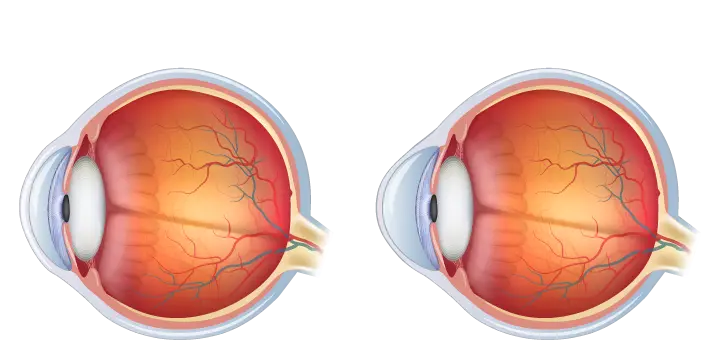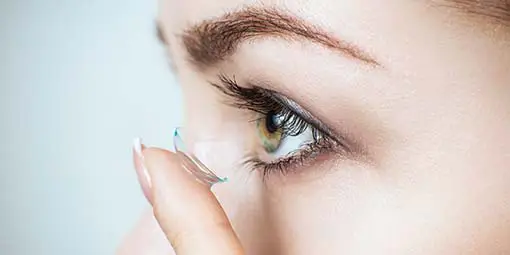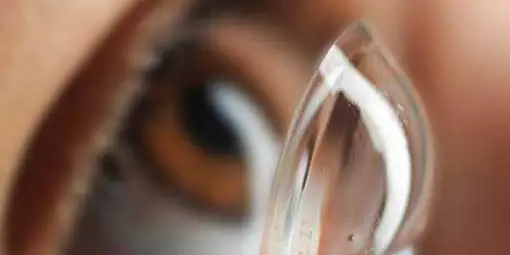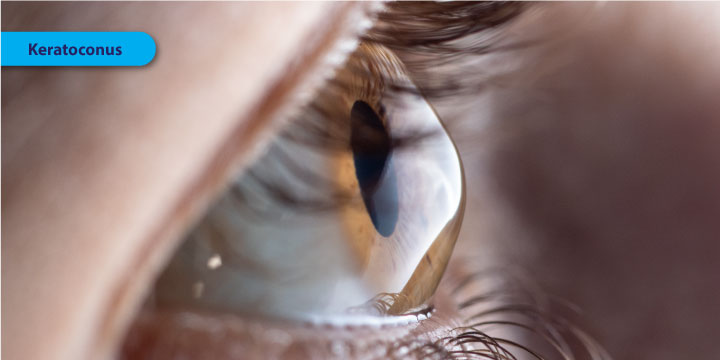Keratoconus - Symptoms, Causes and Treatment
15-06-2025
What is Keratoconus?
A Steepening Of The Cornea
Keratoconus is a progressive eye condition that affects the cornea, causing it to thin and bulge into a cone-like shape. This irregular curvature can lead to distorted vision and difficulty seeing clearly. Patients with keratoconus often experience changes in their prescription and may require specialized contact lenses or surgery to improve their vision. Regular monitoring by an optometrist is essential to manage the condition and prevent further deterioration of vision.
What Are The Causes Of Keratoconus?
Genetics, Evironment & Hormones
The exact cause of Keratoconus is not well understood, but it is believed to be a multifactorial condition with a combination of genetic, environmental, and hormonal factors likely playing a role. Some studies suggest that a genetic predisposition may make certain individuals more susceptible to developing the condition. Additionally, chronic eye rubbing, certain inflammatory conditions, and hormonal changes during puberty or pregnancy may also contribute to the development of Keratoconus. Research is ongoing to better understand the complex interplay of factors that contribute to the progression of this condition.What Are The Risk Factors For Keratoconus?
There are several risk factors associated with the development of Keratoconus. These include a family history of the condition, as it is often passed down genetically. Rubbing the eyes excessively can also increase the risk of developing Keratoconus, as can certain medical conditions such as Down syndrome and Ehlers-Danlos syndrome. Additionally, individuals who have a history of frequent eye rubbing or have a history of wearing poorly fitted contact lenses may be at a higher risk for developing Keratoconus. It is important for individuals with these risk factors to be aware of the potential for developing Keratoconus and to have regular eye exams to monitor for any signs or symptoms of the condition.What Are The Symptoms Of Keratoconus?
Blurry Vision & Changing Prescriptions
Symptoms of Keratoconus typically include blurry or distorted vision, increased sensitivity to light, and difficulty seeing at night. Patients may also experience frequent changes in their eyeglass or contact lens prescription, as well as sudden worsening of vision. In some cases, individuals with Keratoconus may also notice halos or streaking around lights, and may have trouble with glare or ghosting of images. As the condition progresses, patients may also develop astigmatism, which can further impact their ability to see clearly. If you are experiencing any of these symptoms, it is important to schedule an eye exam with an optometrist for a proper evaluation and diagnosis.How is Keratoconus Diagnosed?
Annual Eye Exams & Corneal Topography
Keratoconus is diagnosed through a comprehensive eye examination carried out by an optometrist or ophthalmologist. During the examination, the eye doctor will conduct various tests to assess the shape and condition of the cornea, such as corneal topography, which maps the curvature of the cornea, and slit-lamp examination, which allows for a detailed view of the cornea's structure. Additionally, the doctor may measure the thickness of the cornea and evaluate the patient's vision to determine if there are any irregularities that may be indicative of Keratoconus. If Keratoconus is suspected, further testing may be necessary to confirm the diagnosis.How is Keratoconus Treated?
Scleral Contact Lenses | Cross-Linking
Keratoconus can be effectively treated through a variety of methods, depending on the severity of the condition. One common treatment option is the use of specialized contact lenses, such as rigid gas permeable lenses or scleral lenses, to help improve vision by reshaping the cornea. Another treatment option is corneal cross-linking, a procedure that involves applying riboflavin eye drops to the cornea and then exposing it to ultraviolet light to strengthen the corneal tissue. In more advanced cases, corneal transplant surgery may be necessary to replace the damaged cornea with a healthy donor cornea. It is important to consult with an eye care professional to determine the most appropriate treatment plan for each individual case of Keratoconus.Is There A Cure For Keratoconus?
There is currently no cure for Keratoconus. However, there are various treatment options available to help manage the condition and improve vision. These may include the use of specialized contact lenses, such as rigid gas permeable lenses or scleral lenses, to correct vision and provide comfort. In some cases, surgical procedures such as corneal cross-linking or corneal transplants may be recommended to stabilize the cornea and improve vision. It is important for individuals with Keratoconus to work closely with their eye care provider to determine the best treatment plan for their specific needs.How Can Keratoconus Be Prevented?
Keratoconus cannot be prevented as it is a condition that typically develops due to a combination of genetic and environmental factors. However, early detection and regular eye exams can help manage the progression of the disease and prevent further deterioration of vision. Additionally, avoiding activities that can potentially worsen the condition, such as rubbing the eyes aggressively or wearing poorly fitted contact lenses, can help maintain eye health and minimize the impact of Keratoconus on vision. It is important for individuals with a family history of the condition to be vigilant about their eye health and seek prompt treatment if any symptoms arise.Regular eye exams with advanced technologies are essential for the early detection and treatment of keratoconus. Schedule an eye exam with an optometrist today!
Schedule An AppointmentFYEyes Blog Posts

The Benefits Of Scleral Contact Lenses
cleral contact lenses redefine visual clarity and comfort for individuals with unique ocular needs.

Disadvantages Of Scleral Contact Lenses
These custom made, larger than normal, lenses possess a number of challenges.

What Is The Average Cost Of Scleral Contact Lenses (2026)?
Scleral contact lenses are specialized custom-crafted lenses.

5 Important Statistics About Scleral Contact Lenses
Scleral contact lenses offer numerous benefits. Here are 5 important statistics to be mindful of when considering scleral lenses.

Adult Eye Exams
Our advanced eye exams consist of 25+ modern tests and digital scans to assess eye health, function, and visual acuity.

Child Eye Exams
Give your child a clear future with an annual eye exam from our experienced Edmonton optometrists.

Senior Eye Exams
Maintain your vision through your golden years with gold standard eye care from the optometrists at our Edmonton eye clinic.

Contact Lens Eye Exams
Our eye exams for contact lens wearers include test and digital scans to assess eye health, function, visual acuity, and lens fit.

Diabetic Eye Exams
Managing diabetes requires regular eye exams to ensure that diabetes is not causing irreversible vision loss.

Dilated Eye Exams
Dilating the eyes enables our Edmonton optometrists to see more of the eye so that you many never see less.
Our Edmonton Eye Exams Are Comprised Of 4 Phases Of Evaluation

1. Eye Exam Pre-Testing
Corneal Thickness | Intraocular Pressures | Visual Field
Pre-testing is a detailed process that gathers all necessary information for the optometrist in advance of the optometrist-administered eye examination. This process involves completing a detailed patient history, as well as a series of standard tests. Pre-testing is an essential part of the comprehensive eye exam process, providing valuable information and visuals for both the optometrist and the patient.
More About Pre-Testing »
2. Advanced Diagnostic Testing
Retinal Photography, OCT, Topography
eye-deology Vision Care differentiates itself from other clinics by having the most advanced modern diagnostic specialty testing equipment. Specialty equipment, such as a wide-angle high-resolution retinal imager, Optical Coherence Tomography (OCT), Humphrey Visual Field Analyzer and corneal topographer, ensures that patients receive the best comprehensive eye care.
More About Advanced Testing »
3. Optometrist Examination
Health Assessment & Disease Diagnosis
eye-deology Vision Care Edmonton optometrists perform a multitude of tests and assessments to evaluate ocular health, eye coordination, and visual acuity. In addition, they also evaluate the results of the tests and scans performed during pre-testing. As part of patient education, our optometrists also take the time to show and explain results to patients.
More About Doctor Exam »
4. Eye Glass Consult
Prescription | Lens Selection | Digital Fitting
If you require corrective lenses to improve your vision, our licensed opticians will customize their fit to your unique attributes, needs, lifestyle, and budget. Our opticians are happy to provide you with information about the latest eyeglass frame and lens technologies available so you can make informed decisions and begin seeing and looking your best.
More About Eyewear Consult »